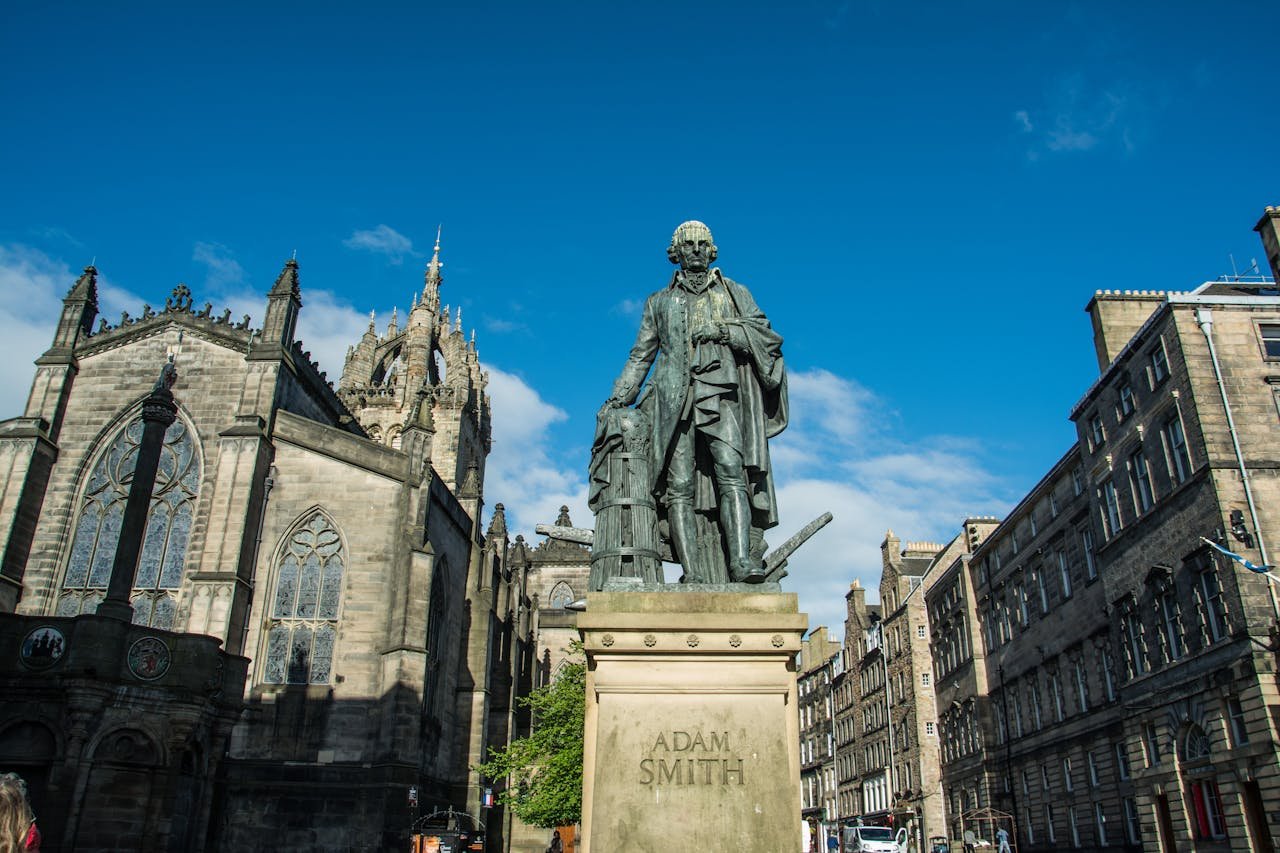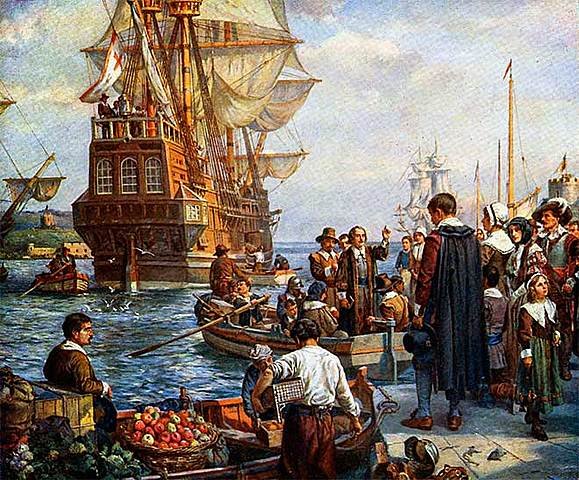Introduction to the Chicago School
The Chicago School stands out as one of the most influential currents in modern economics. Founded at the University of Chicago, this school of thought has promoted a clear and decisive view on free markets and the fundamental role of markets in economic regulation since its inception. Its theories and proposals have been crucial in shaping economic policies in different parts of the world, firmly positioning the concept of free trade as an essential pillar of economic development.
The main focus of the Chicago School lies in the belief that free markets are the most efficient and fair way to manage and distribute economic resources. Markets, when less interfered with by government restrictions, can achieve more optimal equilibria, thereby facilitating economic growth and innovation. This theory has been notably defended and popularized by prominent figures such as Milton Friedman, who argued that state intervention should be minimal to allow market forces to operate freely.
In the context of international trade, the Chicago School has consistently advocated for free trade, emphasizing that reducing trade barriers produces mutual benefits for both developed and developing countries. According to this view, when economies open their markets and eliminate tariff restrictions, they not only improve efficiency and competition but also encourage a greater diversity of products and services available to consumers.
The influence of the Chicago School has extended far beyond academic confines, affecting both national and international economic policy formulation. By embracing free trade and emphasizing the centrality of markets, this school of thought has left a lasting mark on how we understand and manage the global economy today.
History and Development of the Chicago School
The Chicago School, originated at the University of Chicago, established itself as one of the most influential currents in 20th-century economic theory. Its roots trace back to the 1940s, when a series of prominent economists began developing ideas that challenged the dominant Keynesian economic paradigm of the time. This school of thought emphasized the importance of free markets and minimal government intervention in the economy, proposing that such conditions resulted in the most efficient allocation of resources.
Jacob Viner, although not formally part of the Chicago School, had a significant influence on its development, particularly in the area of international trade. As a professor at the University of Chicago, Viner mentored several economists who would later be associated with the Chicago School. His work on the theory of comparative advantage and his analysis of trade and tariff policies laid the foundation for the free-market approach that characterizes this school. Viner influenced the thinking of economists such as Milton Friedman, who adopted and expanded his approach to the efficiency of free trade and the minimization of state intervention in international markets.
One of the main exponents of the Chicago School was Milton Friedman, whose work in macroeconomics and monetary theory had a significant impact on global economic policies. Alongside Friedman, other notable economists including George Stigler, Gary Becker, and Robert Lucas contributed to the consolidation of this school of thought. They focused on analyzing human behavior from a perspective based on incentives and the principles of the free market.
The evolution of the Chicago School’s ideas also left a deep mark on the field of international trade. Economists associated with this school promoted trade liberalization, arguing that eliminating trade barriers and adopting free trade policies resulted in mutually beneficial outcomes for the nations involved. The influence of these theories can be seen in the proliferation of trade agreements and the reduction of tariffs globally in recent decades.
In the modern context, the Chicago School continues to have a significant presence in economic debate. Its core principles have shaped contemporary trade practices and policies, reaffirming that economic freedom and competition are essential for global growth and prosperity. Thus, the ideological transformation generated by the Chicago School remains relevant, demonstrating its profound influence on economics and international trade.
Key Principles of the Chicago School in International Trade
The Chicago School, represented by prominent figures such as Milton Friedman, maintains that international trade is a natural extension of the free market. According to this economic school, the principles that guide transactions between individuals and firms at the domestic level are equally applicable globally. The central idea is that free and unrestricted trade promotes a more efficient allocation of resources, increases competition, and fosters innovation.
One of the fundamental concepts is comparative advantage. This principle, derived from the classical theories of economist David Ricardo and embraced by the theorists of the Chicago School, argues that countries should specialize in the production of goods and services they can produce more efficiently. In doing so, all nations involved benefit, as specialization and exchange allow each country to make the most of its productive strengths.
Another crucial concept is creative destruction. Driven by economist Joseph Schumpeter, though not exclusively associated with the Chicago School, this theory argues that innovation and competition generate a continuous cycle of creation and destruction in markets. In the context of international trade, this means that companies and economies that adapt their products and processes will remain competitive, while those that do not will be displaced. This process, though disruptive, is seen as essential for long-term economic progress.
Finally, economists of the Chicago School strongly advocate for trade liberalization. They argue that trade barriers such as tariffs and quotas distort market signals and protect less efficient industries. Instead, they propose that free trade allows international markets to function without state intervention, thus maximizing global economic benefits. The lack of state intervention is a fundamental pillar of this theory, as economists of this school firmly believe that markets are more efficient and fair when allowed to operate freely.
Significant Contributions to International Trade
The Chicago School has been a cornerstone in contemporary economic theory, deeply influencing international trade. Some of the most prominent economists of this school have left a significant legacy that continues to shape global economic policies and theories.
Milton Friedman, one of the founders of the Chicago School, strongly defended free trade and flexible exchange rates. Friedman argued that free markets allowed for more efficient resource allocation and promoted sustainable economic growth. His theories on free trade highlighted the importance of reducing trade barriers and promoting liberalization, thus facilitating more agile economic exchange between nations.
Another prominent economist, George Stigler, contributed with his analysis of regulation and the role of competition in a market economy. Stigler maintained that vigorous competition is essential for the proper functioning of international markets. His work helped understand how regulatory policies can influence a country’s competitiveness on the global stage, highlighting the importance of a regulatory environment that fosters competition and innovation.
Behavioral economics and human capital theory, developed by Gary Becker, also had a notable impact on international trade. Becker proposed that investments in education and workforce skills are crucial for economic growth and international competitiveness. His approach highlights how educational policies can influence a nation’s capacity to participate effectively in the global economy.
Finally, Robert E. Lucas Jr.’s contributions to rational expectations theory have changed the way economists think about trade and macroeconomic policies. Lucas argued that economic agents make decisions based on rational expectations of the future, which implies that trade policies must be predictable and consistent to be effective. This theory has helped shape a more strategic approach to economic policy formulation, especially in the international realm.
Together, the contributions of these Chicago School economists have provided a robust framework for understanding and improving international trade, emphasizing the importance of the free market, competition, investment in human capital, and policy predictability.
Theories and Models Developed
The Chicago School, known for its liberal and free-market approach, has significantly contributed to the formulation of economic theories and models that have impacted international trade. One of the most influential economists of this school, Milton Friedman, developed theories that emphasize the benefits of free trade and competition in global markets. Friedman posited that free trade policies promote economic efficiency and growth, arguing that trade barriers such as tariffs have adverse effects on national welfare.
One of the prominent mathematical models derived from the Chicago School is the rational expectations model, which suggests that economic agents use all available information to make rational decisions, anticipating government policies. This model supports the idea that interventionist policies, such as tariffs, are generally ineffective since economic agents adjust their behavior to such interventions, neutralizing them in the long term.
Another significant model is the theory of comparative advantage, which, although not exclusive to Milton Friedman, was promoted and adapted by Chicago School economists. This model states that countries should specialize in producing goods for which they have a lower opportunity cost, thereby facilitating beneficial exchanges that increase the global efficiency of trade.
The contemporary application of these theories can be observed in the current debate on tariff barriers and their impact on international trade. For example, recent trade tensions and the implementation of tariffs have been analyzed through the lens of the Chicago School, which generally warns of the negative effects of such barriers, such as price increases and decreased consumer choice.
In summary, the models and theories developed by the Chicago School have provided a robust framework for understanding and analyzing international trade. These approaches remain relevant and applicable in the context of global economic dynamism, informing contemporary policies and decisions regarding free trade and market competitiveness.
Impact and Applications in International Trade Policy
The Chicago School, with prominent figures such as Milton Friedman, has left a significant imprint on the formulation of international trade policies. Its emphasis on free markets, reduced government intervention, and the importance of competition has resonated in various countries, significantly influencing their economic policies.
A clear example of this influence is seen in countries that have liberalized their markets under the guidance and advice of economists aligned with the Chicago School. Chile, during the dictatorship of Augusto Pinochet, adopted economic liberalization measures based on the recommendations of economists trained at this school, known as the «Chicago Boys.» These policies included the elimination of trade barriers, deregulation of the economy, and privatization of state-owned companies. As a result, Chile experienced sustained economic growth in the following decades, although not without criticism for the associated social costs.
Another notable case is New Zealand, which in the 1980s also implemented radical reforms based on similar principles. The elimination of agricultural subsidies and the opening of its economy to international trade significantly transformed its economic structure, making it one of the most open and competitive economies in the world.
Comparing these cases with economies that have followed other economic currents, a notable contrast is observed. Countries that have adopted more protectionist or interventionist stances, such as some European nations, have had mixed results in terms of growth and international competitiveness. While some maintain a higher level of social protection, they often sacrifice the economic agility and competitiveness promoted by the ideas of the Chicago School.
It is evident that the influence of the Chicago School on international trade policies has been profound. The policies derived from its principles have shown benefits in terms of economic growth and competitive efficiency, although they have also generated debates about social costs and equity. This demonstrates the importance of thoroughly evaluating each economic approach based on its global outcomes and specific impacts.
Criticisms and Controversies
The Chicago School, famous for its defense of free markets and laissez-faire, has been the subject of numerous criticisms over the years, particularly in relation to its approach to international trade. Critics argue that the insistence on reducing state intervention and allowing markets to self-regulate can lead to significant imbalances and negative consequences for certain sectors and communities. The emphasis on free trade, without adequate protections, can exacerbate economic inequalities both within and between countries.
One of the most prominent points of controversy is the belief that the laissez-faire approach can favor more developed nations to the detriment of less developed ones. According to this criticism, the elimination of trade barriers favors economies that are already industrialized and have a competitive advantage, making it difficult for emerging industries in developing countries to grow. Detractors argue that some degree of state intervention is necessary to level the playing field and protect local economies.
Another controversial aspect of the Chicago School is the assumption that markets will always balance efficiently. Global and regional financial crises have highlighted the limitations of this perspective, showing that markets can be irrational and prone to bubbles and collapses. Critics argue that the lack of regulation can lead to excessive speculative behavior, which can destabilize economies and cause lasting damage.
However, economists associated with the Chicago School, such as Milton Friedman, have vigorously defended their theories. They have argued that any form of state intervention tends to be inefficient and prone to error due to the complexity of markets and the lack of perfect information. They maintain that, in the long run, the benefits of free trade and unimpeded markets far outweigh their disadvantages and that market-based solutions are best suited to correct their own failures.
In this context, the debate remains essential on how to balance the principles of free trade with the need for state intervention to achieve equitable and sustainable economic development.
Conclusion and Final Reflections
The Chicago School has had a profound and lasting impact on modern economics and international trade. Its focus on market freedom, economic efficiency, and minimal government intervention has shaped the economic policies of many countries since the mid-20th century. Milton Friedman, as one of its main exponents, promoted ideas that emphasize the role of the free market in creating wealth and providing more efficient services, both nationally and internationally.
In the context of international trade, the ideas of the Chicago School have driven deregulation and the opening of trade borders. The theory and practice of free trade find support in the principles of this school, which holds that open markets allow for a more optimal allocation of resources, generate competitiveness, and foster innovation. This approach has been fundamental to the development of trade agreements and global economic integration.
Today, policies inspired by the Chicago School remain relevant, though not without criticism. Globalization and free trade have brought significant benefits, such as economic growth and the expansion of opportunities. However, they have also generated challenges, such as inequality and adverse effects on certain economic sectors and communities. These complex dynamics highlight the need to balance free market principles with policies that protect the most vulnerable.
Looking to the future, the relevance of the Chicago School’s concepts in free trade will depend on their ability to adapt to changes in the global economy. Future policies will need to consider not only the potential for economic growth but also inclusion and sustainability. The influence of the Chicago School in shaping these approaches will undoubtedly remain a key topic of discussion in the development of global economic strategies.
References
- Friedman, Milton (1962). Capitalism and Freedom. University of Chicago Press.
- Stigler, George J. (1971). «The Theory of Economic Regulation.» Bell Journal of Economics and Management Science.
- Becker, Gary S. (1964). Human Capital: A Theoretical and Empirical Analysis, with Special Reference to Education. University of Chicago Press.
- Lucas, Robert E. Jr. (1988). «On the Mechanics of Economic Development.» Journal of Monetary Economics.
- Friedman, Milton (1953). «The Case for Flexible Exchange Rates.» Essays in Positive Economics.
- Stigler, George J. (1963). Capital and Rates of Return in Manufacturing Industries. Princeton University Press.
- Lucas, Robert E. Jr. (1972). «Expectations and the Neutrality of Money.» Journal of Economic Theory.
- Coase, Ronald (1960). «The Problem of Social Cost.» Journal of Law and Economics.


